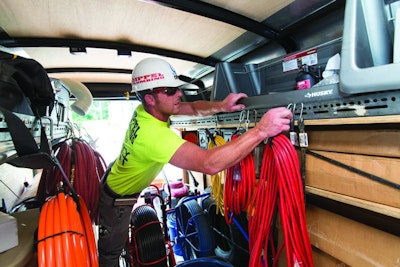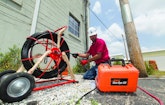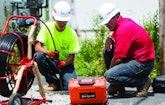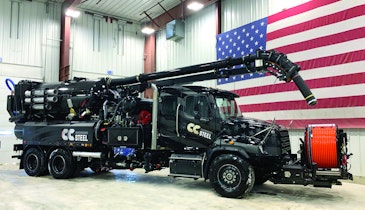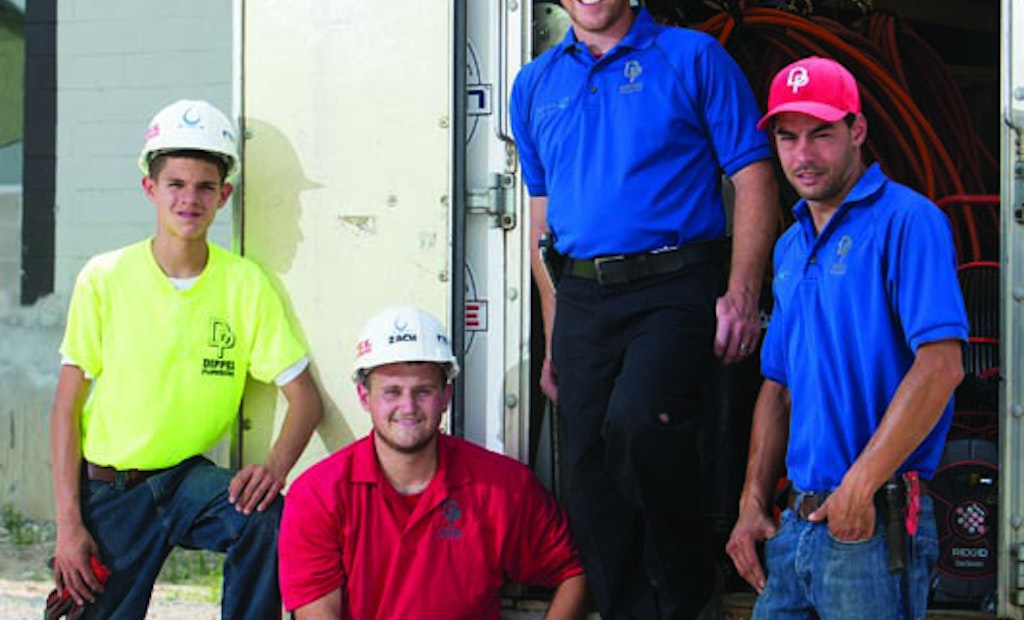
Interested in Cleaning?
Get Cleaning articles, news and videos right in your inbox! Sign up now.
Cleaning + Get AlertsWhen Chris McNulty picked up the Dippel Plumbing company torch in 2010, he was determined to bring the iconic business back to its former glory.
McNulty’s great-grandfather, Arthur J. Dippel, founded the firm in 1945 and eventually passed it on to his daughter, Karen Marks, and a cousin. McNulty joined the company in 1995, became manager in 2002, then acquired his master plumber and master drainlayer licenses before purchasing the company in 2010.
The recession hit the firm hard, however, and their crew was reduced from 12 to a mere three plumbers in the field. Nevertheless they struggled through and found that with so many other firms going out of business, the phone continued to ring.
Within four years at the helm as owner, McNulty built the crew back to a healthy 11, including six plumbers and five technicians (three working as apprentices). McNulty expects that with their continued growth he will require a team of 20 plumbers by the end of 2014 in order to meet commitments.
“We do about 2,400 jobs a year,” McNulty says, adding that Dippel Plumbing vans are a familiar sight in St. Louis, and when they get a phone call they always ask how the caller found them. People frequently say they saw Dippel trucks out on jobs.
Old systems, new technology
McNulty had already added relining to the company’s menu of services but he didn’t just want to use Nu Flow’s relining system as a service of Dippel Plumbing; he wanted to take it a step further. In 2013, he secured a license with Nu Flow for Nu Flow St. Louis, allowing the company to offer the system and its services to other plumbers. He says it has been a tremendous boost to their overall business and a powerful advantage for the company.
As Nu Flow St. Louis, their presence in the area goes beyond the family firm to another entity unto itself, available to a more extensive client base. They have a broad base for their relining services, covering all of Missouri and parts of southern Illinois.
Some of the clay, cast-iron and Orangeburg pipes in their service area were installed over 100 years ago. Cracks are common, and the cast iron often rots out from the inside. They also contend with the always-present issue of root intrusion.
Over the years, Dippel Plumbing frequently excavated and replaced failing lateral lines, but the problems that arise with these jobs – the homeowner deciding the concrete at the retaining wall is not replaced quite the way it should be, or the basement floor is not exactly how it was prior to the job – convinced McNulty he would rather offer relining.
He has spent a good bit of effort educating the public on the advantages of relining by offering seminars to real estate firms, insurance companies and plumbing contractors. Dippel Plumbing often gets phone calls from plumbing firms that are having problems with a line replacement because of a retaining wall or other obstruction. These are opportunities for Nu Flow St. Louis to come to the rescue.
Picking up the pieces
His goal as owner was to rebuild Dippel Plumbing to what it had been years before. This required a few essential elements, the first being the crew.
“We were turning down contracts because we did not have the manpower,” he says. “The number of phone calls we were getting was crazy.”
Dippel is a union shop, and McNulty would sometimes bring in a crew from the union hall when the company had a large job. He wanted to hire full-time employees, however, and that took some time. Often he would interview several candidates before finding the right person. He likes to train his crew, and new hires are required to join the union.
“We wanted that manpower,” he says. “It’s hard to explain how it kind of grew. We had people who took an interest in the company, and once we found the key guys we more or less gave them free rein to do their job. We have the younger generation of men and have grown into a good family thing. That is how we have grown. With the key guys, we could handle that requirement. Ben Bippen is my general foreman, and my wife, Carla, is office manager.”
It was also important to maintain the customer base along with a high level of communication and focus as new services and new people were brought on board.
New technology was another key piece of the growth puzzle. Dippel would continue to provide complete plumbing and inspection services, but new services were just as important. McNulty saw relining as essential to growth. For many years the company offered sewer patching, but he could see that he needed to provide other options. He also decided to add pipe bursting for water lines, believing this would be another opportunity.
“We still do some excavation work for lateral lines,” McNulty says. “And we are a turnkey contractor. We find our customers prefer this. When we go in on a job as prime contractor we do it from start to finish.”
The puzzle pieces began to come together, and by 2014 Dippel was doing 50 percent in plumbing and the balance in the other sectors. The customer base remains mainly residential/small commercial, with some municipal work and new construction projects as welcome additional revenue. McNulty is finding that some general contractors will bring his crew in to take over an entire contract rather than subbing out to a number of other firms for a specific project.
Facing the facts
“We have been told numerous times that we are too expensive,” McNulty says, noting the business has always been a union shop. “Then we often get a phone call back asking if we can fix a problem. We pay our employees union wages, and we do not offer discount services. We are a 24/7 shop and we work seven days a week to keep up with demand.”
He says their reputation for good work has benefited the company over the years because there are no cut-rate offers for service. In the long run, reputation has trumped this as an obstacle.
With new hires, a journeyman will go right into the field, expected to handle the problem. A key employee might drop in to see how things are going. If things are progressing well they are satisfied.
New apprentices ride along with another employee for several months until they’re proficient in that arena and then move on to learn another service. Technicians working with Nu Flow will progress to receive their plumbing license.
“Employees move around until we believe they are ready to do a specific job,” McNulty adds.
“We may bring a worker on the crew and have to let him go a month later if we have disgruntled customers. The last thing I want is to go out to dinner and have an upset customer come over to complain about a job. What we want to happen is for someone to come over and say how well things went and it was a job well-done.”
Adding personnel can be a costly drain on a small company so he wants to make the right choice. The wrong hire might stay for a only short time – a week or a few months – but the cost to hire can run from $20,000 to $30,000 when everything is considered.
“That will be money down the drain, so to speak,” he says.
McNulty describes his management style as more or less relaxed, and he says he has faith in his crew. “I’m out in the field and that is what I prefer, being out there with the guys. I have that confidence that our team will be more productive because they have my trust.”
He also says the business is very much like a family. “We’ve had some knockdown fights in the office. Not physical of course. And then we turn around and everyone forgets it and goes back to work. A guy might quit at 6 p.m. one night, but show up for work at 7 a.m. the next day. That is kind of how it works.”
Building on history
Dippel Plumbing continues to operate in the same area in St. Louis, right across the street from the original office. They have a small adjoining yard where some of the trucks and other equipment can be parked. Plumbers take their vans – a mix of Fords and Chevrolets – home each evening.
Cameras come from General, RIDGID and Ratech. The trailer jetter is from General Pipe Cleaners, the JM-2512 Typhoon, and the pipe bursting system is from Pipeline Products.
By mid-2014, McNulty was booked as much as two months ahead, but he keeps one serviceman free at all times for residential work. In some instances the crew is working seven days a week, and the company is right on course to meet the goals he set.
It has been a challenge for McNulty, but he has seen the opportunities, set goals and followed his plan.
“What brings me the most pleasure, the most reward, is having the opportunity to grow the company, to be able to send our team in to solve a problem.”
